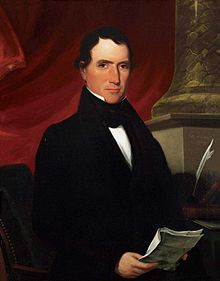William Rufus King
| William R. King | |
|---|---|

Portrait of King, painted by George Cooke in 1839
|
|
| 13th Vice President of the United States | |
|
In office March 4, 1853 – April 18, 1853 |
|
| President | Franklin Pierce |
| Preceded by | Millard Fillmore |
| Succeeded by | John C. Breckinridge |
| President pro tempore of the United States Senate | |
|
In office May 6, 1850 – December 20, 1852 |
|
| Preceded by | David Rice Atchison |
| Succeeded by | David Rice Atchison |
|
In office July 1, 1836 – March 4, 1841 |
|
| Preceded by | John Tyler |
| Succeeded by | Samuel L. Southard |
| United States Minister to France | |
|
In office April 9, 1844 – September 15, 1846 |
|
| Preceded by | Lewis Cass |
| Succeeded by | Richard Rush |
|
United States Senator from Alabama |
|
|
In office July 1, 1848 – December 20, 1852 |
|
| Preceded by | Arthur P. Bagby |
| Succeeded by | Benjamin Fitzpatrick |
|
In office December 14, 1819 – April 15, 1844 |
|
| Preceded by | None (Statehood) |
| Succeeded by | Dixon Hall Lewis |
| Member of the U.S. House of Representatives from North Carolina's 5th district | |
|
In office March 4, 1811 – November 4, 1816 |
|
| Preceded by | Thomas Kenan |
| Succeeded by | Charles Hooks |
| Member of the North Carolina House of Commons | |
|
In office 1807–1809 |
|
| Personal details | |
| Born |
William Rufus DeVane King April 7, 1786 Sampson County, North Carolina, U.S. |
| Died | April 18, 1853 (aged 67) Selma, Alabama, U.S. |
| Political party | Democratic |
| Other political affiliations |
Democratic-Republican (Before 1828) |
| Alma mater | University of North Carolina at Chapel Hill |
| Signature | |
William Rufus DeVane King (April 7, 1786 – April 18, 1853) was an American politician and diplomat. He was the 13th Vice President of the United States for six weeks in 1853 before his death. Earlier he had been elected as a U.S. Representative from North Carolina and a Senator from Alabama. He also served as Minister to France during the reign of King Louis Philippe I.
A Democrat, he was a Unionist and his contemporaries considered him to be a moderate on the issues of sectionalism, slavery and westward expansion, which contributed to the American Civil War. He helped draft the Compromise of 1850. He is the only United States executive official to take the oath of office on foreign soil; inaugurated in Havana, Cuba due to poor health. King died of tuberculosis after 45 days in office. With the exceptions of John Tyler and Andrew Johnson—both of whom succeeded to the Presidency—he is the shortest-serving Vice President.
King was the only Vice President from the State of Alabama and held the highest political office of any Alabamian in American history. He was the third Vice President to die in office.
King was born in Sampson County, North Carolina, to William King and Margaret deVane. His family was large, wealthy and well-connected. He graduated from the University of North Carolina at Chapel Hill in 1803, where he was also a member of the Philanthropic Society. Admitted to the bar in 1806 after reading the law with Judge William Duffy of Fayetteville, North Carolina, he began practice in Clinton. King was an ardent Freemason, and was a member of Fayetteville's Phoenix Lodge No. 8.
...
Wikipedia
